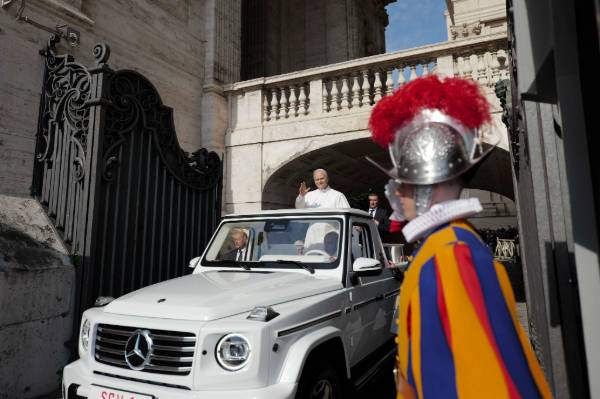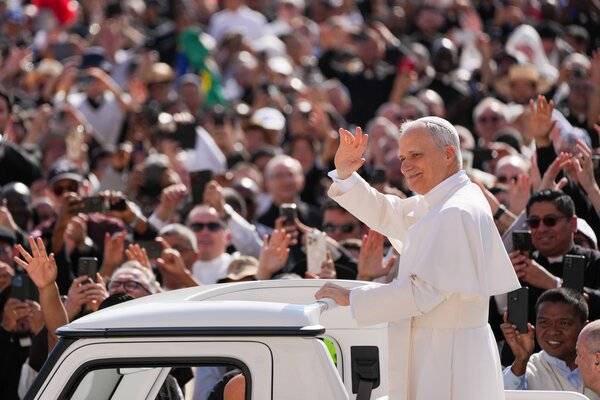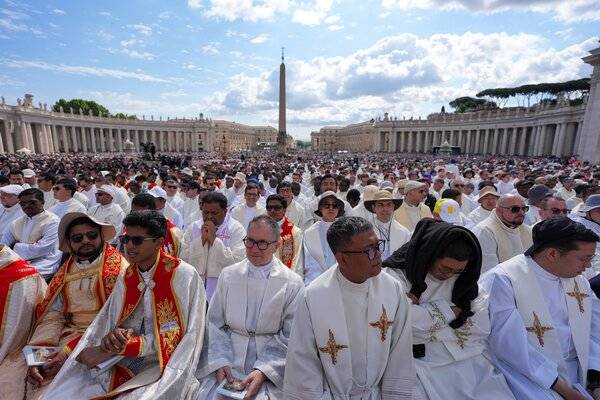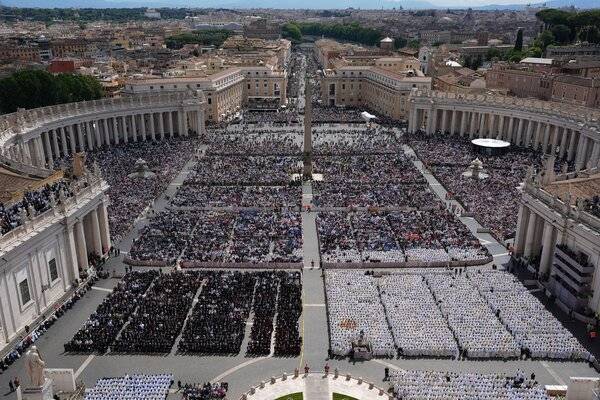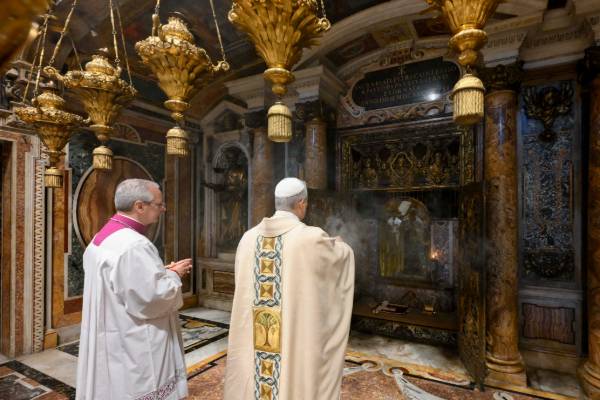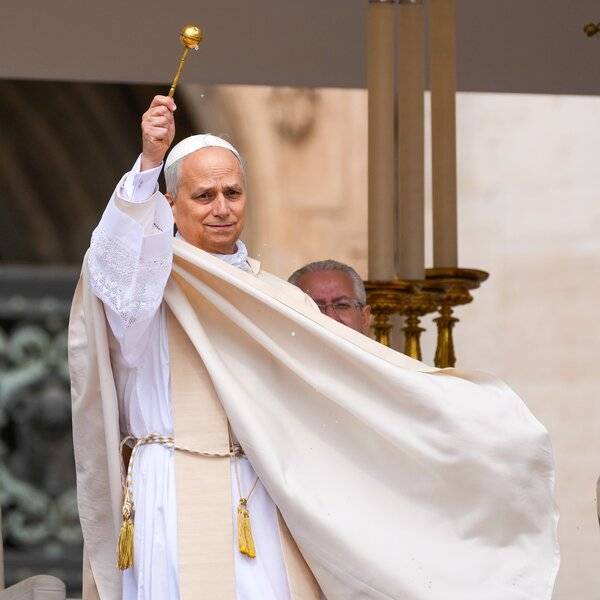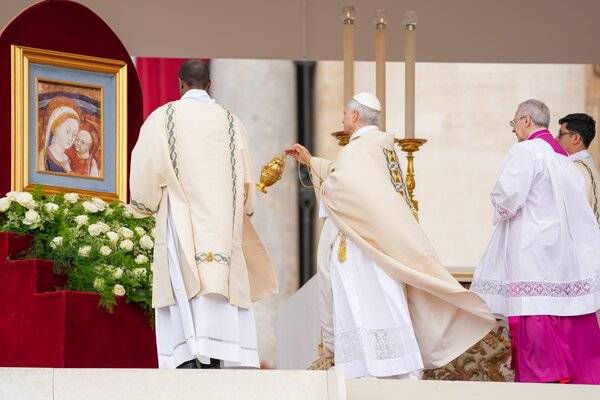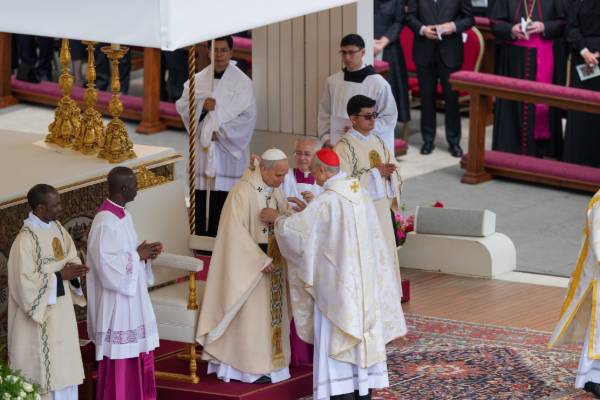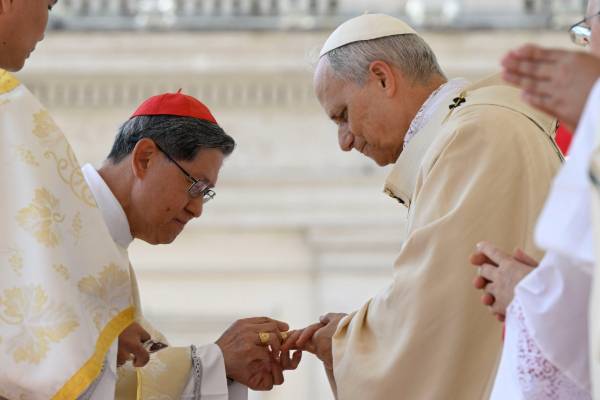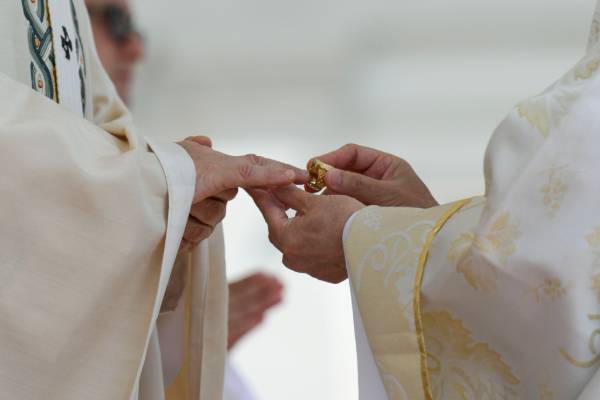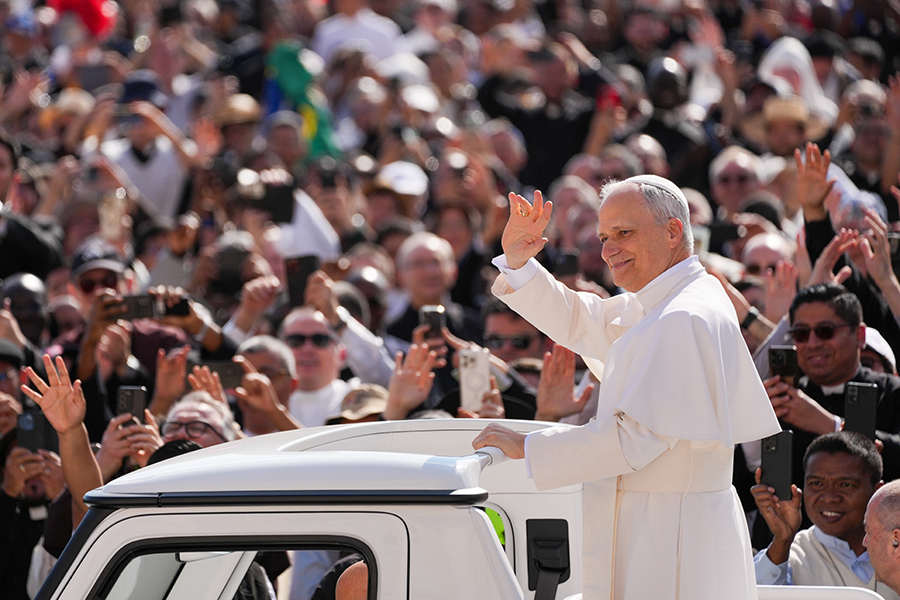
Pope Leo begins papacy calling for 'united church' in a wounded world
VATICAN CITY — Launching his papacy with a call for reconciliation and communion, Pope Leo XIV formally began his ministry as the successor of St. Peter by calling for "a united church, a sign of unity and communion, which becomes a leaven for a reconciled world."
"In this our time, we still see too much discord, too many wounds caused by hatred, violence, prejudice, the fear of difference and an economic paradigm that exploits the Earth's resources and marginalizes the poorest," the new pope said in his homily during his inauguration Mass May 18.
"For our part, we want to be a small leaven of unity, communion and fraternity within the world," he told the estimated 150,000 people gathered in and around St. Peter's Square. "We want to say to the world, with humility and joy: Look to Christ! Come closer to him! Welcome his word that enlightens and consoles! Listen to his offer of love and become his one family: 'In the one Christ, we are one.'"
A version of the quote from St. Augustine is the pope's episcopal motto and is featured on his coat of arms.
Ecumenical and interreligious guests and more than 100 government delegations joined the new pope for Mass in St. Peter's Square. The United States was represented by Vice President JD Vance and Secretary of State Marco Rubio, accompanied by their spouses and senior White House aides.
Vance and the second lady, Usha Vance, visited Pope Francis' tomb in the Basilica of St. Mary Major the evening before the Mass. "He was beloved by many Catholics around the world, and I hope you will join me in praying for the repose of his soul," he wrote in a post on X.
Among the Christian leaders present was Orthodox Ecumenical Patriarch Bartholomew of Constantinople, along with other delegations from the Orthodox churches, the Anglican Communion, the Lutheran World Federation, the World Methodist Council, the World Communion of Reformed Churches and various evangelical and Pentecostal communities. Representatives of the Jewish community as well as Muslim, Hindu, Buddhist, Sikh, Zoroastrian and Jain traditions also were in attendance.
Before the Mass began, Pope Leo rode through the square in the popemobile for the first time since his election May 8, greeting the faithful as cheers of "Viva il papa!" ("Long live the pope!') poured out from the crowd. He then entered the basilica to pray at the tomb of St. Peter, accompanied by patriarchs of the Eastern Catholic churches.
Following the Gospel reading, three cardinals from the different orders within the College of Cardinals took part in the formal beginning of the Petrine ministry: Italian Cardinal Mario Zenari placed the woolen pallium on the pope's shoulders, symbolizing his role as shepherd of the universal church; Filipino Cardinal Luis Antonio Tagle presented him with the fisherman's ring, evoking St. Peter's mission to draw people into Christ's net; and Congolese Cardinal Fridolin Ambongo offered a prayer invoking the strength of the Holy Spirit for the new pontificate.
Representing the universal church, 12 people -- clergy, religious and laity from around the world -- then came forward to offer their obedience to the new pope.
Reflecting on the Gospel reading from St. John -- in which Jesus asks St. Peter three times to tend to his sheep -- Pope Leo said in his homily that the ministry of Peter is rooted not in authority for its own sake, but in love that serves and unites.
"Peter is thus entrusted with the task of 'loving more' and giving his life for the flock," he said. "The ministry of Peter is distinguished precisely by this self-sacrificing love, because the church of Rome presides in charity and its true authority is the charity of Christ."
The successor of St. Peter, he said, "must shepherd the flock without ever yielding to the temptation to be an autocrat, lording it over those entrusted to him." Instead, "he is called to serve the faith of his brothers and sisters, and to walk alongside them."
Pope Leo also recalled the period of mourning following the death of Pope Francis, and he said that the conclave that followed the late pope's death was "a moment of grace."
"I was chosen, without any merit of my own, and now, with fear and trembling, I come to you as a brother, who desires to be the servant of your faith and your joy, walking with you on the path of God's love, for he wants us all to be united in one family," he said.
"With the light and the strength of the Holy Spirit, let us build a church founded on God's love, a sign of unity, a missionary church that opens its arms to the world," he said, calling for a church that "proclaims the word, allows itself to be made 'restless' by history and becomes a leaven of harmony for humanity."
At the end of Mass, the pope called for prayers for regions afflicted by war: Gaza, Myanmar and Ukraine, which "finally awaits negotiations for a just and lasting peace."
Ukrainian President Volodymyr Zelenskyy was present for the Mass and was to have a private meeting with the pope later in the day, the Vatican press office said.
Immediately after the Mass, Pope Leo met with several government representatives including Vance and Rubio, as well as Peruvian President Dina Boluarte. The pope had spent more than 20 years in Peru as a missionary priest and bishop and has Peruvian citizenship.
— Justin McLellan, Catholic News Service
Full text of Pope Leo XIV's homily
-
Full text of Pope Leo XIV's homily
VATICAN CITY— This is the full text of the homily given by Pope Leo XIV in St. Peter’s Square during the Mass of Inauguration of the Petrine Ministry May 18, 2025:
Dear Brother Cardinals,Brother Bishops and Priests,
Distinguished Authorities and Members of the Diplomatic Corps,
Brothers and Sisters,
I greet all of you with a heart full of gratitude at the beginning of the ministry that has been entrusted to me. St. Augustine wrote: “Lord, you have made us for yourself, and our heart is restless until it rests in you” (Confessions, I: 1,1).
In these days, we have experienced intense emotions. The death of Pope Francis filled our hearts with sadness. In those difficult hours, we felt like the crowds that the Gospel says were “like sheep without a shepherd” (Mt 9:36). Yet on Easter Sunday, we received his final blessing and, in the light of the resurrection, we experienced the days that followed in the certainty that the Lord never abandons his people, but gathers them when they are scattered and guards them “as a shepherd guards his flock” (Jer 31:10).
In this spirit of faith, the College of Cardinals met for the conclave. Coming from different backgrounds and experiences, we placed in God’s hands our desire to elect the new Successor of Peter, the Bishop of Rome, a shepherd capable of preserving the rich heritage of the Christian faith and, at the same time, looking to the future, in order to confront the questions, concerns and challenges of today’s world. Accompanied by your prayers, we could feel the working of the Holy Spirit, who was able to bring us into harmony, like musical instruments, so that our heartstrings could vibrate in a single melody.
I was chosen, without any merit of my own, and now, with fear and trembling, I come to you as a brother, who desires to be the servant of your faith and your joy, walking with you on the path of God’s love, for he wants us all to be united in one family. Love and unity: these are the two dimensions of the mission entrusted to Peter by Jesus.
We see this in today’s Gospel, which takes us to the Sea of Galilee, where Jesus began the mission he received from the Father: to be a “fisher” of humanity in order to draw it up from the waters of evil and death. Walking along the shore, he had called Peter and the other first disciples to be, like him, “fishers of men.” Now, after the resurrection, it is up to them to carry on this mission, to cast their nets again and again, to bring the hope of the Gospel into the “waters” of the world, to sail the seas of life so that all may experience God’s embrace.
How can Peter carry out this task? The Gospel tells us that it is possible only because his own life was touched by the infinite and unconditional love of God, even in the hour of his failure and denial. For this reason, when Jesus addresses Peter, the Gospel uses the Greek verb agapáo, which refers to the love that God has for us, to the offering of himself without reserve and without calculation. Whereas the verb used in Peter’s response describes the love of friendship that we have for one another.
Consequently, when Jesus asks Peter, “Simon, son of John, do you love me more than these?” (Jn 21:16), he is referring to the love of the Father. It is as if Jesus said to him, “Only if you have known and experienced this love of God, which never fails, will you be able to feed my lambs. Only in the love of God the Father will you be able to love your brothers and sisters with that same ‘more’, that is, by offering your life for your brothers and sisters.”
Peter is thus entrusted with the task of “loving more” and giving his life for the flock. The ministry of Peter is distinguished precisely by this self-sacrificing love, because the Church of Rome presides in charity and its true authority is the charity of Christ. It is never a question of capturing others by force, by religious propaganda or by means of power. Instead, it is always and only a question of loving as Jesus did.
The Apostle Peter himself tells us that Jesus “is the stone that was rejected by you, the builders, and has become the cornerstone” (Acts 4:11). Moreover, if the rock is Christ, Peter must shepherd the flock without ever yielding to the temptation to be an autocrat, lording it over those entrusted to him (cf. 1 Pet 5:3). On the contrary, he is called to serve the faith of his brothers and sisters, and to walk alongside them, for all of us are “living stones” (1 Pet 2:5), called through our baptism to build God’s house in fraternal communion, in the harmony of the Spirit, in the coexistence of diversity. In the words of St. Augustine: “The Church consists of all those who are in harmony with their brothers and sisters and who love their neighbor” (Serm. 359,9).
Brothers and sisters, I would like that our first great desire be for a united Church, a sign of unity and communion, which becomes a leaven for a reconciled world. In this our time, we still see too much discord, too many wounds caused by hatred, violence, prejudice, the fear of difference, and an economic paradigm that exploits the Earth’s resources and marginalises the poorest. For our part, we want to be a small leaven of unity, communion and fraternity within the world. We want to say to the world, with humility and joy: Look to Christ! Come closer to him! Welcome his word that enlightens and consoles! Listen to his offer of love and become his one family: in the one Christ, we are one. This is the path to follow together, among ourselves but also with our sister Christian churches, with those who follow other religious paths, with those who are searching for God, with all women and men of good will, in order to build a new world where peace reigns!
This is the missionary spirit that must animate us; not closing ourselves off in our small groups, nor feeling superior to the world. We are called to offer God’s love to everyone, in order to achieve that unity which does not cancel out differences but values the personal history of each person and the social and religious culture of every people.
Brothers and sisters, this is the hour for love! The heart of the Gospel is the love of God that makes us brothers and sisters. With my predecessor Leo XIII, we can ask ourselves today: If this criterion “were to prevail in the world, would not every conflict cease and peace return?” (Rerum Novarum, 21).
With the light and the strength of the Holy Spirit, let us build a Church founded on God’s love, a sign of unity, a missionary Church that opens its arms to the world, proclaims the word, allows itself to be made “restless” by history, and becomes a leaven of harmony for humanity.
Together, as one people, as brothers and sisters, let us walk towards God and love one another.
This text was delivered originally in Italian.— OSV News



